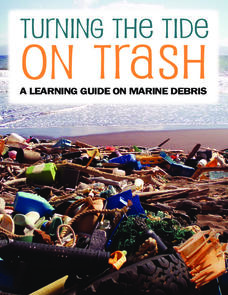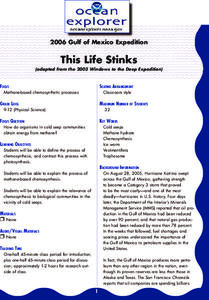Curated OER
National Marine Sanctuaries Fish
Information is provided on Gray's Reef, Florida Keys, and Flower Garden Banks marine sanctuaries. Young marine biologists then visit the FishBase and REEF databases to collect fish species information for each location. They then...
NOAA
Turning the Tide on Trash: A Learning Guide on Marine Debris
The lessons in this learning guide are designed to increase youngsters' awareness of the impacts of marine debris and to teach them about pollution prevention techniques. This fabulous, 30-page packet is chock full of important...
Curated OER
Turning the Tide on Trash: Marine Debris Curriculum
Seven pages of fascinating reading on marine debris preface the activities in this lesson plan. Four different activities are employed to simulate how the debris is distributed in the ocean and along beaches. Early ecology learners...
Curated OER
What's in That Cake?
Cooperative groups research trip logs from deep-sea expeditions and explore characteristics of deepwater habitats. Using a cake as the ocean floor, they work together to decorate it as a model of such habitats. They also prepare a...
Curated OER
Turning the Tide on Trash: Marine Debris Curriculum
Six different lessons comprise this unit on marine debris. Science, language arts, social studies, and art projects make this an ideal interdisciplinary unit. The result will be well-informed future citizens who can help make a...
NOAA
What Little Herc Saw
See the underwater world through a different pair of eyes! Middle school marine biologists identify deep-sea organisms by examining images taken by an ROV from the Okeanos Explorer. After determining what creatures lie beneath the...
NOAA
Watch the Screen!
Can a sponge cure cancer? Life science pupils visit the drugstore under the sea in the fifth lesson of six. Working groups research the topic then get hands-on experience by testing the inhibiting effects of several plant extracts on E....
NOAA
Seafood and Human Health
Whether your young biologists realize it or not, humans play a significant role in marine ecosystems. To help them understand this fact children first create graphical representations that show homo sapiens' place in marine food chains,...
National Wildlife Federation
Plastic in the Sea
How much plastic do people use? Class members identify how plastic is involved in their daily lives by looking at food packaging either at a grocery store or at home. Learners view statistics for the amount of plastics found on a beach...
NOAA
Understanding Food Chains and Food Webs
Jump into an exploration of marine ecosystems with the first lesson in this four-part series. After first learning about crustaceans, mollusks, and other forms of sea life, young marine biologists view a PowerPoint presentation that...
Howard Hughes Medical Institute
Ocean Acidification
Human impacts on the environment can sometimes be difficult to measure, especially under water! An activity centered on ocean acidification gives science scholars the opportunity to examine the effects of carbon dioxide on marine life....
Curated OER
Marine Energy
In small groups, energy engineers research and make a topographic map of a marine natural resource. They report to the rest of the class pros and cons of extracting their assigned resource. The two activities may take up to four class...
NOAA
Deep-Sea Ecosystems – Life is Weird!
A pool of brine in the deep sea can be up to four times as salty as the surrounding sea water. The deep sea ecosystem relies on chemosynthesis and the organisms that live there are often strange to us. The lesson focuses on researching...
Wilderness Classroom
Ocean Life
Our oceans are composed of many complex relationships. Young oceanographers explore relationships between organisms, understand the world ocean's currents, and discover the effects of water pollution and how it behaves. There are three...
NOAA
An Ocean of Energy
Young biologists trace the path of the sun's energy through marine ecosystems in the second part of this four-lesson series. Building on prior knowledge about producers, consumers, and decomposers students are introduced to the concept...
Curated OER
Ecosystems
A critical look into the structure and function of ecosystems is here for young learners as a series of lessons and worksheet activities. Topics covered include land-based and marine ecosystems, connections to the water cycle, food webs,...
NOAA
Biological Oceanographic Investigations – Signals from the Deep
The Deepwater Horizon oil spill directly impacted an area of the Gulf of Mexico the size of Oklahoma. A marine biology lesson looks at the impact of an oil spill on the deeper parts of the ocean. Scholars download actual data collected...
Curated OER
Marine Debris
Now is the time to educate tomorrow's citizens to care for the planet, and here is a lesson to help facilitate the process. Collect some marine debris and bring it into class. Have your class separate it into types and then test each...
Kenan Fellows
The Effects of Environmental Conditions on Aquatic Organisms
What kind of experiment can your class do to how observe the environment effects on organisms? Groups design and conduct lab experiments to learn about the effects of the environment on aquatic organisms. Based upon knowledge gained from...
Curated OER
Whale Song Acrostic
What do whales sing about? Invite your class to imagine the thoughts of whales before writing acrostic poems on the topic. The plan blends together a bit of life science with plenty of opportunities for creativity and writing.
Science Matters
Blubber Gloves: It’s All About Insulation
Instill the concept of adaptation with the help of Blubber Gloves—ziplock bags, shortening, and duct tape. Scholars discuss how animals and plants keep warm in polar regions, record their predictions, and try on their Blubber Gloves to...
NOAA
Build Your Own Ocean Ecosystem
Hold the sea in the palm of your hand! Amateur oceanographers work together to create models of an ocean ecosystem in the sixth and final installment in a series. Raise awareness of global ocean health issues through guided research,...
Virginia Department of Education
Freshwater Food Chains
What's in the water? Encourage your class to further explore this question and learn about pond ecosystems, food chains, and food webs as they complete this hands-on activity. They view the environment from a new perspective after...
Curated OER
This Life Stinks
Chemosynthetic communities of cold seep areas are considered in this lesson. Working in collaborative groups, marine biology or oceanography learners research and prepare a report about oxidation-reduction reactions involved with...

























